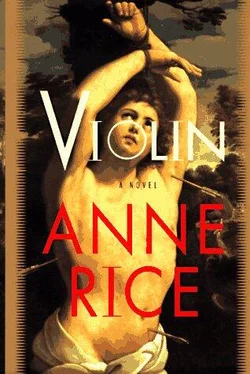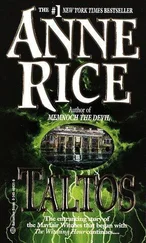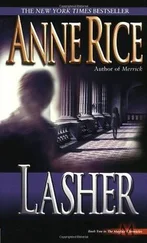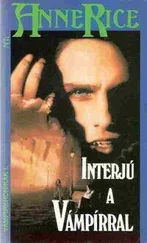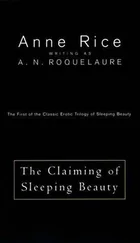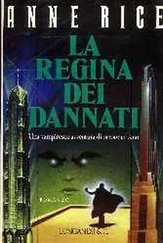"Don't mistake me," Stefan said, gentle, respecting, desperate. "I have money to pay you well for these lessons, Siguore Paganini," said Stefan. "I have a violin, my own, my cherished Stradivarius. I didn't dare to bring my violin, traveling the post roads, days and nights to get here, I came alone. But I have money. I had to hear you first, to know that you would accept me, that you see me as worthy-"
"Oh, but Prince Stefanovsky, must I school you on the history of Czars and their Princes? Your father is not going to permit you to study with the peasant Niccolo'
Paganini. Your destiny is the service of the Czar, as it has always been with your family.
Music was a pastime in your house, oh, don't take offense, I know that Metternich himself'-he leant forward to whisper to Stefan-" the happy little dictator himself, plays the violin and well, and I have played for him. But for a Prince to become what I have become. Prince Stefanovsky, I live by this, my violin!" He gestured to the instrument in its case of polished wood, which seemed ever so much like a tiny coffin. "And you my handsome Russian youth must live by Russian tradition and Russian duty. The military awaits you. Honors. Service in the Crimea."
Cries of praise from above. Torches at the dock. Women in rustling clothes rushing up against a new and steeper bridge. Pink nipples in the night, bodices laid back like wrapping to display them.
"Paganini, Paganini."
Roses again, falling down on the man as he brushed them away and looked intently at Stefan. The great cloaked hump of the woman beside him flashed a white hand down in the dark between Paganini's legs, fingers playing as if his private parts were a lyre, if not a violin. He seemed not even to notice.
"Believe me, I want your money," Paganini said. "I need it. Yes, I play for the dead, but you know of my stormy life, the lawsuits, the entanglements. But I am a peasant, Prince, and I will not give up my itinerant victories to prison myself up in Vienna in a drawing room with you-ah, the critical Viennese, the bored Viennese, the Viennese who did not even give Mozart his bread and butter; did you know him, Mozart?
No, and you cannot remain with me. Already, no doubt, Metternich, at your father's behest, has sent someone to look for you. I'll become accused of some nasty treason in all this."
Stefan was crushed, head bowed, cheeks so tender with pain, and deep-framed eyes glittering with the reflected light from the torpid but shiny water.
An interior:
A Venetian room, unkempt and blistered from the damp, chalky dark walls and soaring yellow ceiling with only faded remnants of a pagan swarm that had burnt so new and bright before its death in Stefan's rich Viennese palace. A long drape, a slash of dark dusty burgundy velvet and a deep green satin tangled with it, hung from a high hook, and out the narrow window, I saw the ochre colored wall of tile palace opposite so close that one could reach across the alley if one wished and knock upon the solid wood green shutters.
The unmade bed was heaped with tapestried robes and crumpled linen shirts with costly Reticella lace, the tables stacked with letters, wax seals broken, and here and there lay the stubs of candles. Everywhere bouquets of dead flowers.
But, look:
Stefan played! Stefan stood in the middle of the room, on the shiny Venetian oiled floor, playing not this, our spectral violin, but another undoubtedly by the same master.
And round Stefan, Paganini danced, playing variations that mocked Stefan's theme, a contest, a game, a duet, a war perhaps.
It was a somber Adagio Stefan played, by Albinoni, in G minor for strings and organ, only he had made it his solo, moving from part to part, his grief encompassing his fallen house, and through the music I could see the burning palace faintly in the Vienna cold and all the beauty turned to kindling. The music, slow, steady, unfolding, held Stefan himself so in thrall he seemed not to see the cavorting figure near him.
Such music! It seemed the very maximum of pain that could be declared with perfect dignity. It bore no accusation. It spoke of wisdom and deepening sadness.
I felt my tears come, my tears which are like hands to applaud, the signal of the empathy in me for him, this boyma n standing there, as the Italian genius made his Rumpelstiltskin circle about him.
Thread after thread from the Adagio Paganini pulled loose to race it into a caprice, a frolic of fingers darting too swiftly along the strings even to be traced, and then he would with perfect accuracy descend to catch the very phrase which Stefan at his somber pace had only just reached. Paganini's dexterity seeming sorcery, as it was always said, and in all this-this lone imperially slim figure played immune in his pain, and Paganini, the dancer who mocked or tore the shroud for its gleaming threads-there was nothing discordant but something wholly new and splendid.
Stefan's eyes were closed, his head tilted. His full sleeves were stained from rain perhaps, the fine pun to in aria lace torn at the cuffs, his boots streaked with dried mud, but his arm was perfect in its measures. Never had his dark straight eyebrows looked so smooth and beautiful, and as he took the organ part of this famous music now, I thought my heart would break for him, and even Paganini drew in, slipping into this most tortured of moments merely to play with Stefan, to echo him, to cry above him and below but with honor.
The two stopped, the tall boyish one looking down with utter wonder at the other.
Paganini laid down his violin carefully on the tasseled covers and pillows of the jumbled bed, all golden and midnight blue. His big pop eyes were generous and his smile demonic. The man seemed embraceable in his exuberance. He rubbed his hands.
"Yes, gifted, yes, you are! Gifted!"
You'll never play like that! That was my ghost captain whispering in my ear, even as his whole body clung to mine and pleaded with me for solace.
I didn't answer. Let the picture roll.
"You'll teach me then," said Stefan in flawless Italian, the Italian of Salieri and all his like, the wonder of the Germans and the English.
"Teach you, yes, yes, I will. And if we must get out of this place, then we shall, though you know what you do to me in these times, with Austria so bent on keeping my Italy under her thumb, you know. But tell me this."
"What?"
The little man with the huge eyes laughed; he walked up and down; his heels clicked on the oiled floor, his shoulders were almost humped, his eyebrows long and curling at the ends as if he'd enhanced them with stage paint when he hadn't.
"What, dear Prince, am I to teach you? For you know how to play, yes, that you can do. You can play. What is it that I must bring to a pupil of Ludwig van Beethoven?
An Italian levity perhaps, an Italian irony?"
"No," said Stefan in a whisper, eyes fastened on the pacing man. "Courage, Maestro, to throw all else aside. Oh, it is sad, sad to me that my teacher will never hear you.
Paganini paused, lips puckered. "Beethoven, you mean.
"Deaf, too deaf now even for the high notes to pierce, too deaf," said Stefan softly.
"And so he can't give you the courage?"
"No, you misunderstand!" Stefan held the gift violin that he had played, looked at it.
"Stradivari, yes, a present to me, fine as your own, no?" said Paganini.
"Indeed, perhaps better, I don't know," said Stefan. He took up the former point. "Beethoven could teach anyone courage. But he is a composer now, deaftiess forced this on him as you know, boxed the ears of the virtuoso until he couldn't play, and left him locked up with pen and ink as the only means of making music."
"Ah," said Paganini, "and we are the richer for it. I would so like just once to see him from a distance perhaps or have him watch me play. But if I make an enemy of your father, I'll never even enter Vienna. And Vienna is . . . well, after Rome, there is . . .
Читать дальше
